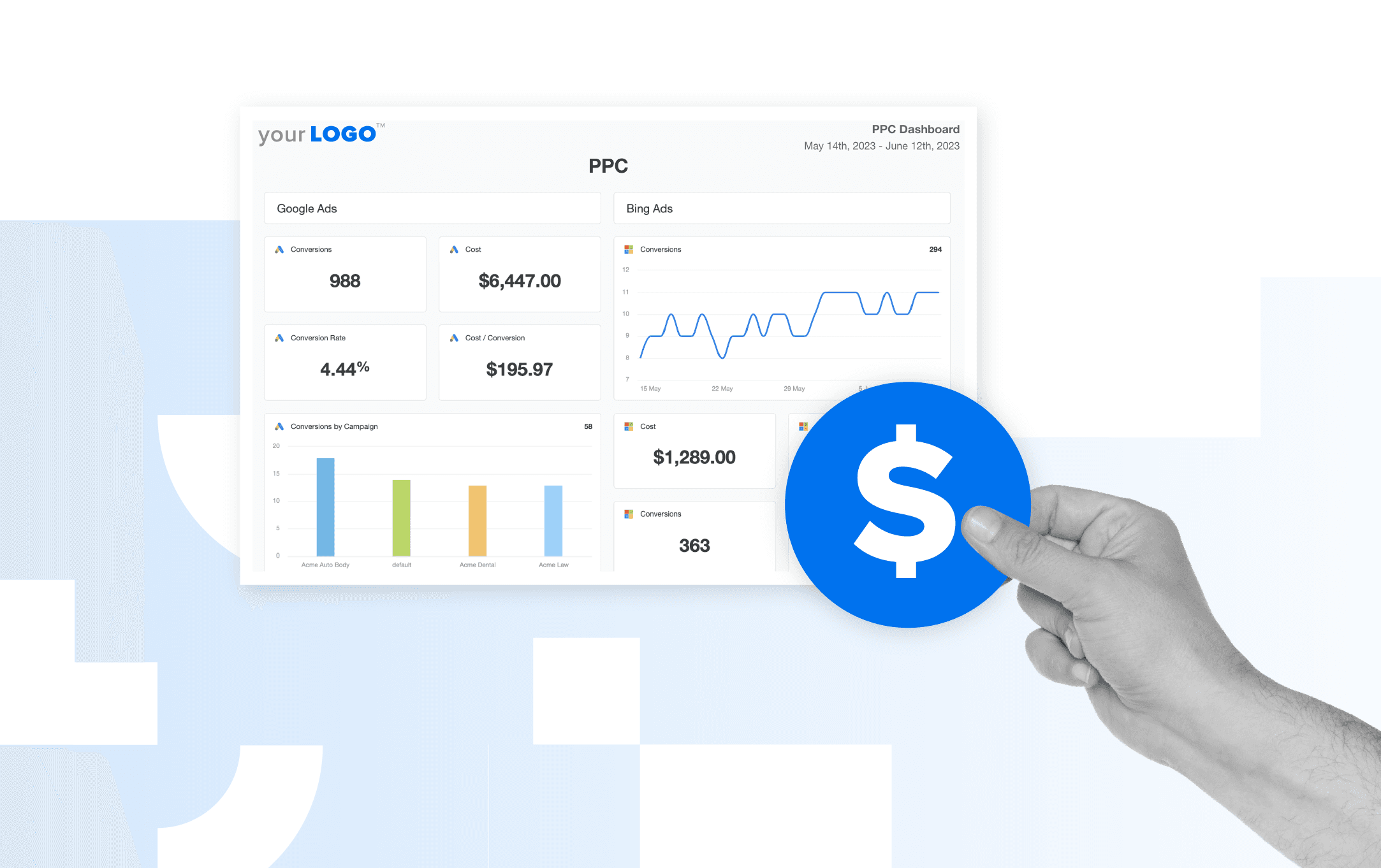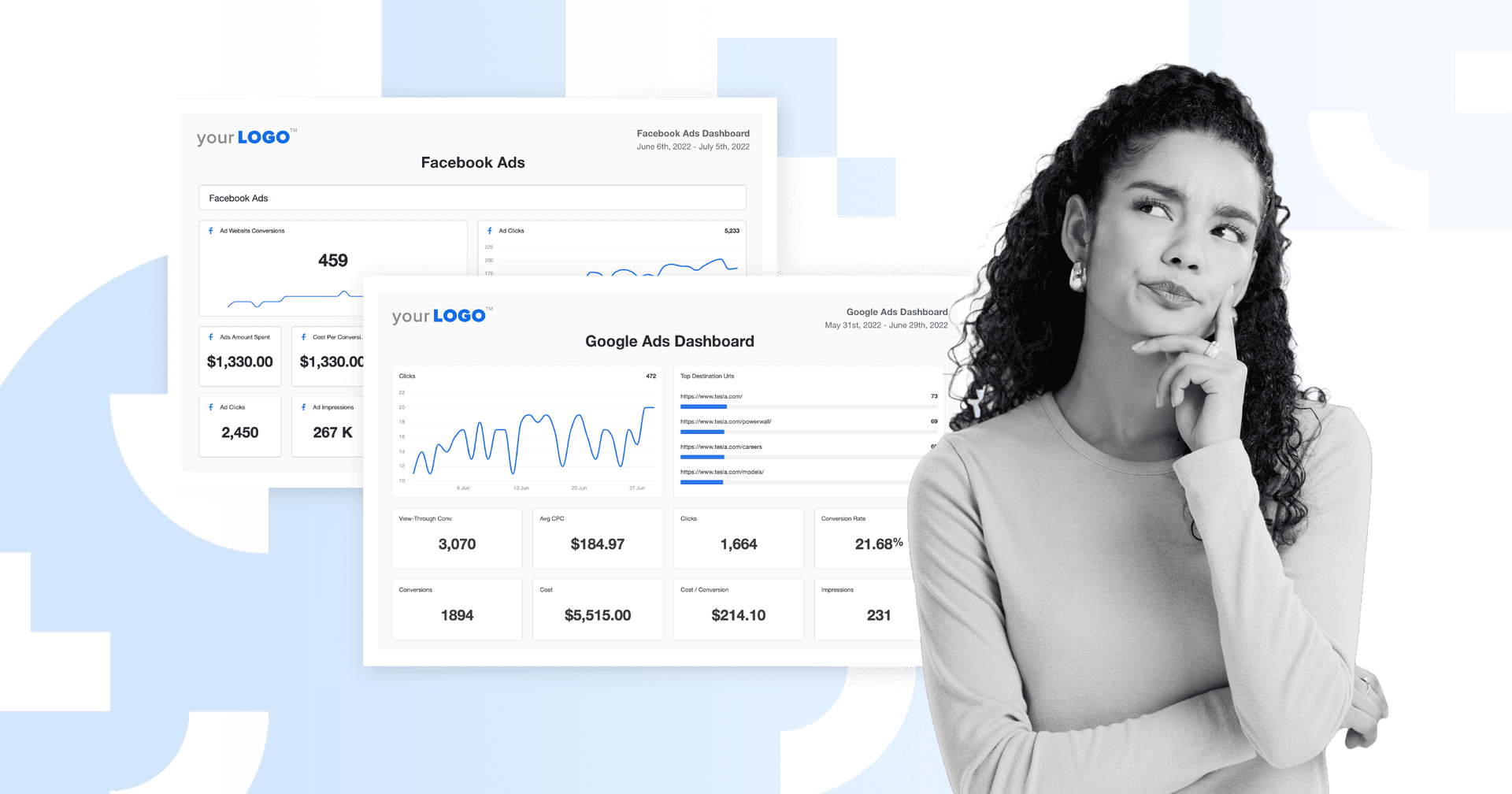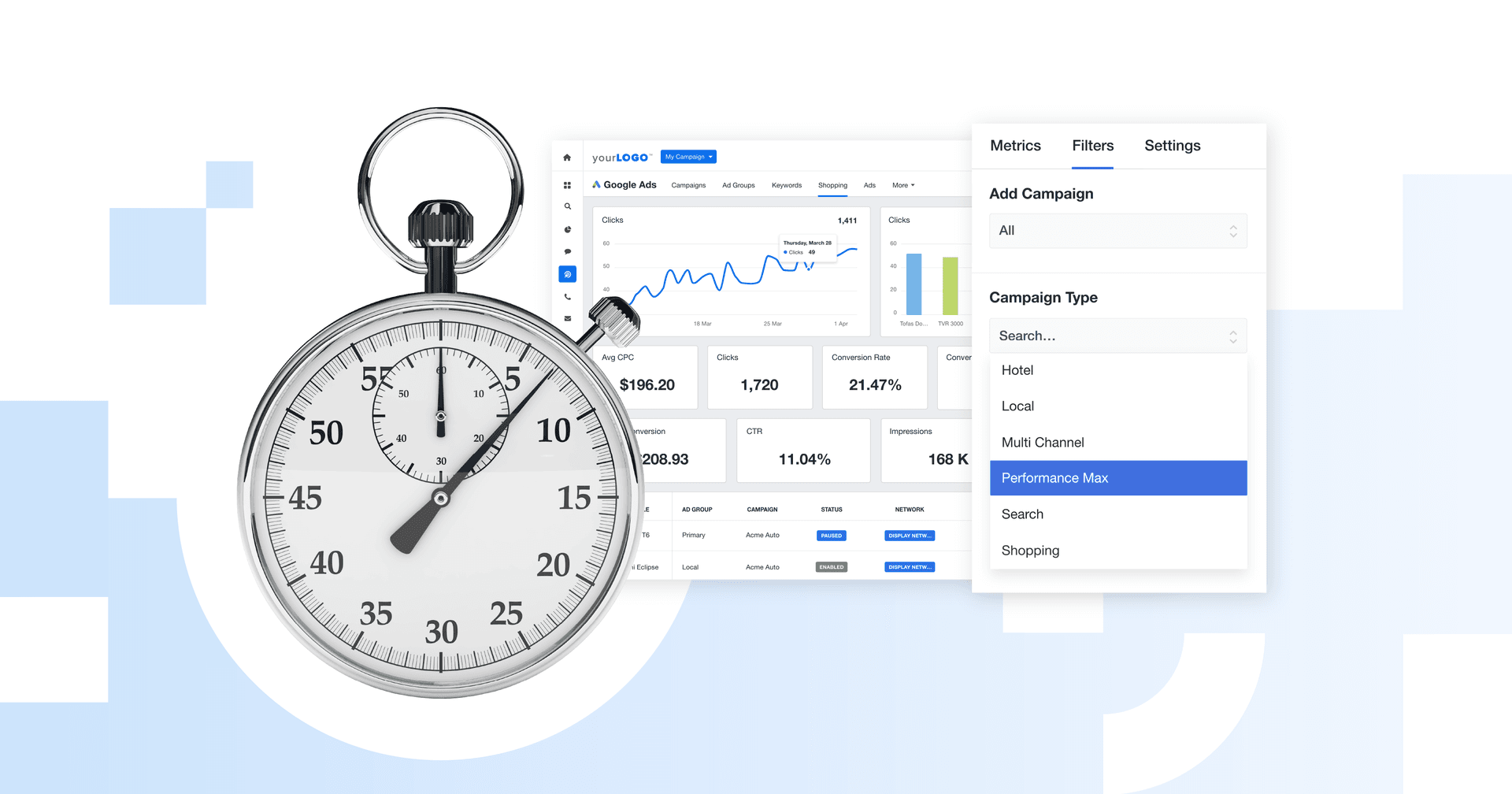Table of Contents
QUICK SUMMARY:
Thinking about your agency’s PPC pricing for 2025? This guide breaks down real benchmarks, pricing models, and expert insights from agency leaders. Whether you charge flat fees, a percentage of ad spend, or use a hybrid model, you’ll find practical tips, updated data, and a free PPC budget calculator to help you price with confidence and for profitability.
To your average client, success in a PPC marketing campaign can be a complete mystery. It happens, but they often have no idea why and would be hard-pressed to replicate it.
That’s where your agency comes in. You avoid the pitfalls of wasting precious PPC budgets and use every successful best practice out there to create consistent results. You create poignant ad creatives, squeeze maximum results from each campaign, measure metrics from each ad group, tweak, and repeat.
But each one of your client accounts is different, needing different services and workloads. So how should you determine your agency’s PPC management pricing, and how much is considered fair? A comprehensive marketing strategy is essential for determining PPC management fees, as it integrates PPC with other marketing services and considers factors like budget, goals, and industry.
This article will equip you to decide which PPC management pricing model is best suited for your agency. We’re delivering advice straight from marketing agency execs to help you evaluate your options.
The State of PPC in 2025
Even as new channels emerge, Google still controls nearly 90% of the global search engine market in 2025, a staggering figure that underscores the platform's enduring power. When combined with Meta, this duopoly continues to command the vast majority of digital ad spend in the U.S., cementing its position as the twin pillars of the online advertising world.
This reinforces a fundamental truth for agencies and their clients: A strategic presence on Google Ads is essential for reaching today's consumer.
The PPC advertising model works remarkably well, delivering fast results compared to any other marketing channel. And Google Ads is the godfather of that family.
How Much Does PPC Management Cost in 2025?
Based on 2025 data, the cost of PPC for an average small and medium-sized business on Google Ads ranges from $500 to $10,000 per month, with some larger companies spending significantly more.
The management fee often reflects underlying PPC advertising costs, determined as a percentage of monthly ad spend, typically ranging from 10% to 20%. Other common pricing models include flat monthly fees, hourly rates, and performance-based pricing.
For agencies handling PPC across multiple platforms, the budget can vary significantly. Here are the median monthly ad spends for some of the top PPC ad platforms as of January 2025, based on data collected from more than 7,000 AgencyAnalytics users:
PPC Ad Platform | Median Monthly Ad Spend - January 2025 |
|---|---|
Google Ads | $1,024.79 |
Microsoft Ads | $353.76 |
Meta Ads | $784.33 |
LinkedIn Ads | $734.53 |
Of course, these median values fluctuate based on the client's industry, location, and other factors. For example, industries with higher competition, like legal services, can expect a higher cost-per-click and overall ad spend.
Comparing CPC In Different PPC Channels
Based on benchmark data from more than 7,000 AgencyAnalytics users, here’s how cost-per-click (CPC) stacks up across the top PPC platforms in 2025:
Channel | Cost Per Click |
|---|---|
Google Ads | $1.81 |
Microsoft Advertising | $1.29 |
Meta Ads | $0.39 |
LinkedIn Ads | $3.18 |
Should Your Agency Offer Google or Microsoft Ads (Formerly Bing Ads)?
While we often incorrectly trade the word "Search" for "Google,” that search engine is not the only show in town.
True, Google is the biggest. It gets over 8.5 billion searches per day, or 255 billion queries each month, compared to 5.53% for Microsoft Ads. And Google Ads boasts over one million advertisers.
So it's a no-brainer which network to use, right? Not necessarily. As always, it depends on your criteria.
Sure, Google will get your clients more impressions, but the Microsoft Ad network can cost up to 70% less per click. Because of its smaller market share, it won't be competing with as many others for those clicks.
That's important for many of your clients who are trying to grow their business on a budget.
The Google vs. Microsoft Ads debate won’t be resolved anytime soon. In fact, there’s room for both. And you're probably going to be diversifying your platforms even more as social media ad spending continues to rise:
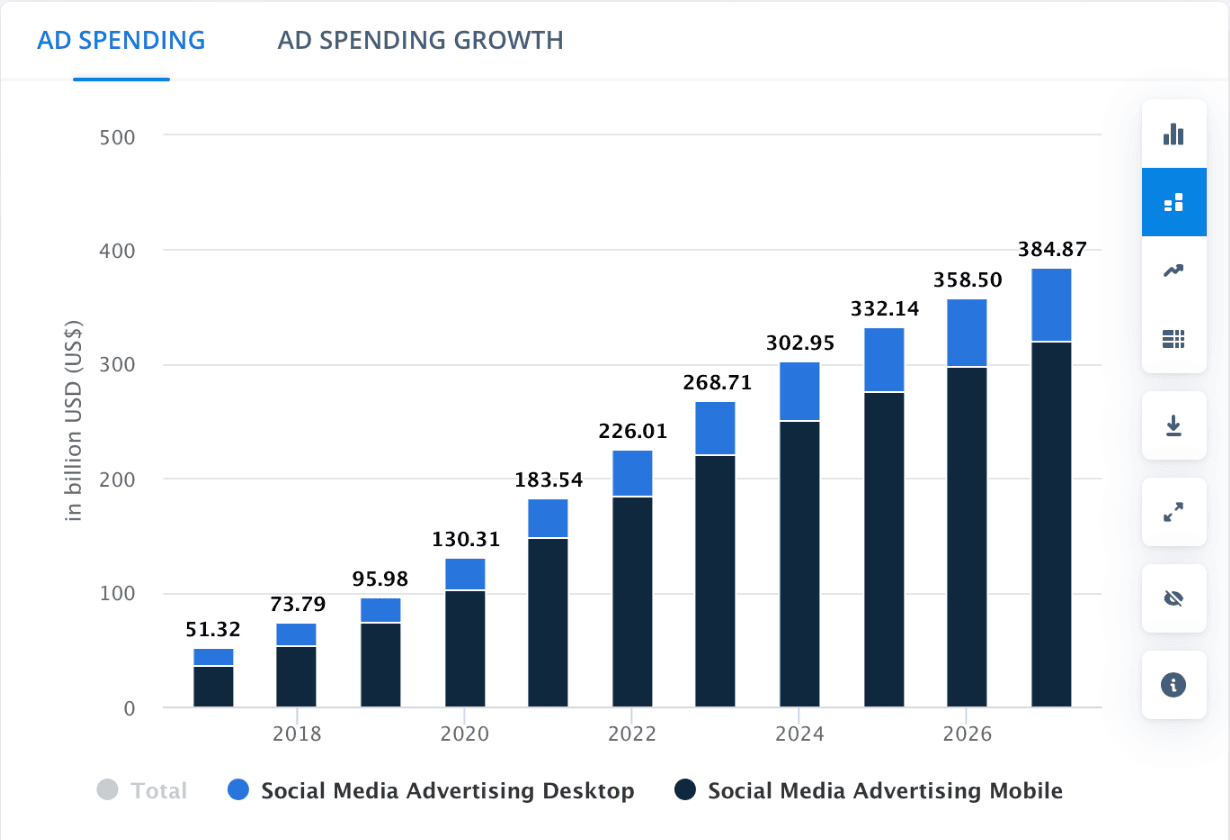
For agencies that are new to the PPC game, you can't very well charge the same as an established expert. But if Microsoft Ads and Facebook Ads, for instance, are part of your service offering in addition to "just" Google, you can charge more for that.
Different PPC Agency Pricing Models to Consider
Anyone can charge $100 and throw together a basic PPC campaign that will likely not do anything for a client’s business. As a professional PPC management agency, your services should reflect your level of expertise, and your payment structure should reflect the value you bring.
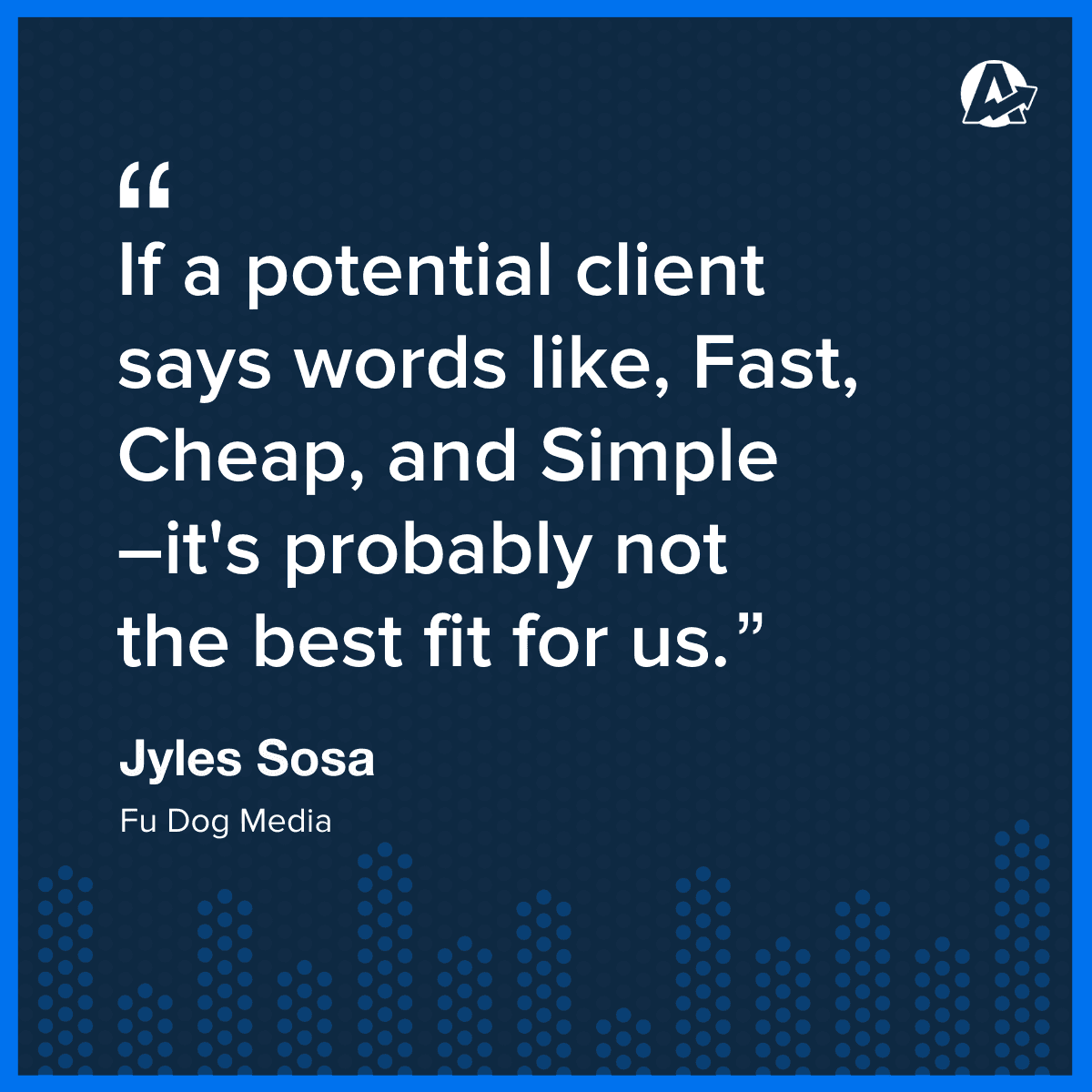
Different pricing models can affect the allocation of the ad budget for various advertising platforms. But when it comes to how to build that fee structure, the options are varied, so we’ve surveyed our agency clients to determine how they charge for their services–and why.
Let's explore the following ad agency PPC pricing models (later we’ll also look at which models fit best with different ad platforms):
PPC Pricing Model | Pros | Cons |
|---|---|---|
Flat Fee | Predictable pricing and billing transparency. | Doesn’t factor in that some accounts require more attention than others. |
Hourly Rate | Serves clients based on their needs and budget. | Penalizes the agency if they are working efficiently and reducing the time spent on each campaign. |
Percentage of Ad Spend | Correlates with the impact of the agency’s management work. | Focuses on growing the investment which doesn't place the client's interests first. |
Performance-based | Works in theory, as clients love this concept. | Doesn’t work in practice as PPC management has many moving parts that are unpredictable each month. |
Hybrid | Flexible pricing based on each client’s needs and requirements. | Complicated billing when there are individual deals for each client. |
Model #1 – The Flat Fee 💵
A flat rate pricing model can be a good option for agencies that want to provide clear and predictable pricing to clients while also streamlining their own internal processes.
Justin Hoffman, Founder and CEO, Web Solutions Firm
This one is tricky to pull off in the early days of your agency, as it requires a bit of experience to determine the likely time and effort each account will need. Once you accurately estimate what your agency will drive for a new client, it does bring in a steady and reliable paycheck.
Always the same amount regardless of the fluctuating workload.
Though the budget will determine the number of campaigns we are able to manage for a client we feel that a flat fee model is the easiest way to stay transparent in our relationship with clients versus a percentage of ad spend as that may not warrant any additional work.
Adam Huycke, Owner, Peritive Digital
Adam Huycke, Owner of Peritive Digital, believes in keeping it simple and being ultra transparent: “Clients want to be able to trust you with their money, make it easy for them to do so by eliminating fluff data points and focusing on what really moves the needle.” He adds that your client reporting needs to be “simple and be ultra-transparent. Clients want to be able to trust you with their money, make it easy for them to do so by eliminating fluff data points and focusing on what really moves the needle.”
Agency Pro Tip: Revisit your agency’s PPC pricing if the client drastically changes the budget or requirements. You don’t want to run the risk of spending countless billable hours for free trying to keep up with their changing demands.
Justin Hoffman, Founder and CEO of Web Solutions Firm, recommends basing your PPC pricing on the value you can deliver to your clients rather than just your time or costs. "Instead of pricing your services solely based on the number of hours you'll spend on a campaign or the amount you'll spend on advertising, consider the potential ROI your clients can achieve through your PPC services. This could include factors like increased leads, sales, and revenue, as well as improved brand awareness and engagement."
By pricing based on the value you can deliver, you'll not only be more competitive in the market, but you'll also be able to show your clients the true impact of your PPC services on their business. This can help build stronger relationships and lead to more long-term, high-value clients.
Justin Hoffman, Founder and CEO, Web Solutions Firm
Model #2 – The Hourly Rate ⏱️
We implemented an hourly charge model as it helps us serve our clients based on their needs and budget.
Christopher Ryan, CEO, SIX Marketing
Most PPC agencies prefer to work by contracted retainer or project rather than by the hour.
However, clients often love hourly rates, as it's easy to see a direct correlation between how much work you're doing for them (the number of hours you bill) and the cost to them (those hours multiplied by the hourly rate).
“If an account requires more attention to increase performance, our clients know it will likely accelerate growth,” says Christopher, adding, “if we have strategy dialed in and we are mostly optimizing the campaigns, that provides us the ability to focus on other channels.”
That said, you're penalizing yourself if you work efficiently and reduce the time you spend on each campaign.
For example, if it typically takes your agency 2.5 to 3 hours each month to manually create client reports, those are billable hours. They may not be the most effective use of billable time, but they are billable.
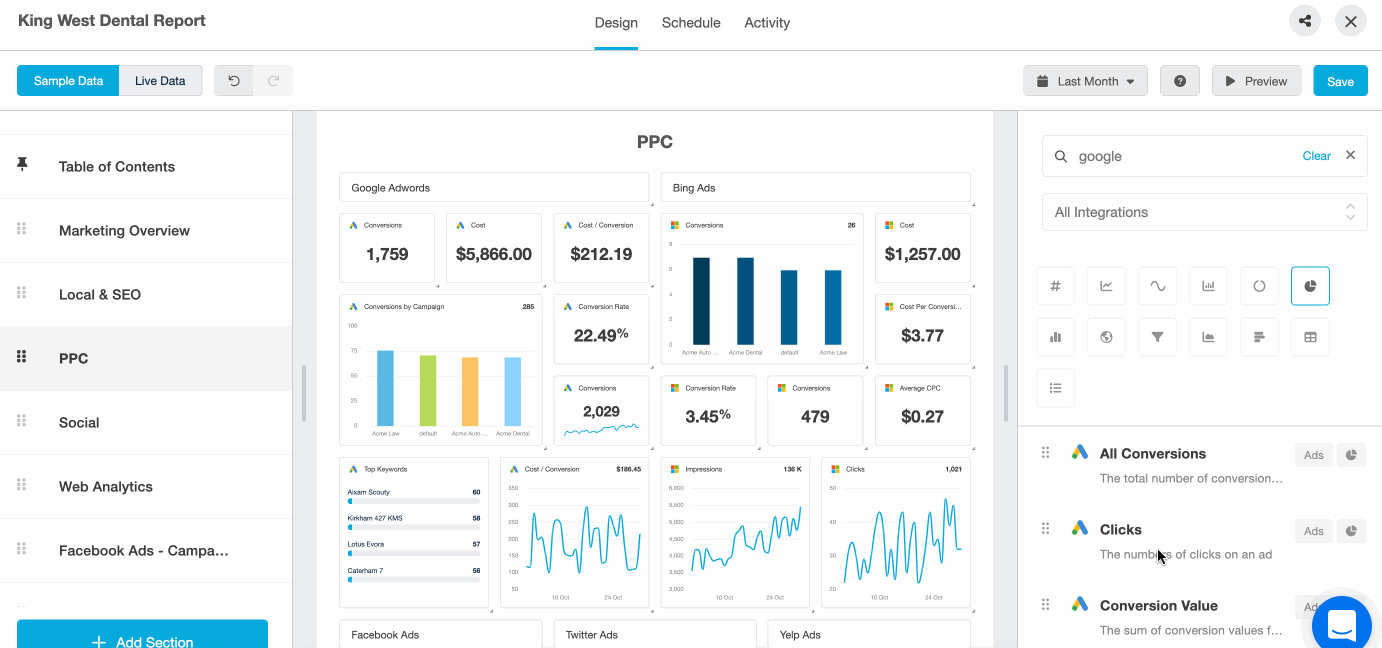
Keep all your clients’ KPIs under one roof to stay on top of campaigns. Create client-ready reports in minutes with AgencyAnalytics. Start your free 14-day trial today.
Using an automated process to reduce that reporting time to less than an hour will streamline your agency's processes and improve your reporting, but you could "lose" those billable hours.
As a boutique agency, the more time we can save on admin tasks, the more time we can spend doing what we’re best at!
Claire Aldridge, Digital Marketing Specialist, Victory Digital
Therefore, setting your PPC agency up based on an hourly rate can penalize your efforts to improve workflows.
Flat monthly fees, or an agreed upon number of monthly hours, tend to apply to campaigns and associated ad groups that are already up and running and just need monitoring, tweaking, and evaluation.
Gail Snow Moraski, Principal, Results Communications & Research
Model #3 – The Percentage of Ad Spend %
We use it as a pricing guide for Google Ads management, the principle being the greater the Ad spend the greater the complexity and impact of our management work.
Richard Jaggs, Founder,Resolution Design
As an agency, it's crucial to track your clients' return on ad spend (ROAS) to justify your services. This is the industry norm, with agencies charging anywhere from 10-20% of total ad spend. Smaller operations might fall on the lower end with an account minimum to cover costs.
There's a misconception that this model "punishes" the client for increasing their budget. While it's true that the client has to pay more as they increase their PPC budget, the PPC agency also has to work harder to find new opportunities and manage larger campaigns. Larger budgets generally involve more work in managing PPC campaigns, and with a bigger budget, you should be generating more leads.
Therefore, you're bringing more value to the client and should be charging accordingly. And how do you showcase those new leads? Through data visualization. Your client’s data should tell a story so they easily understand the value your agency brings to their business. Automate PPC reports so that story arrives on schedule without manual assembly.
When you charge based on ad spend, you're essentially adding a markup to every lead generated. For example, say you're charging 10% of ad spend. The CPA is $40 in Google Ads. Therefore, the cost to the client is $44.
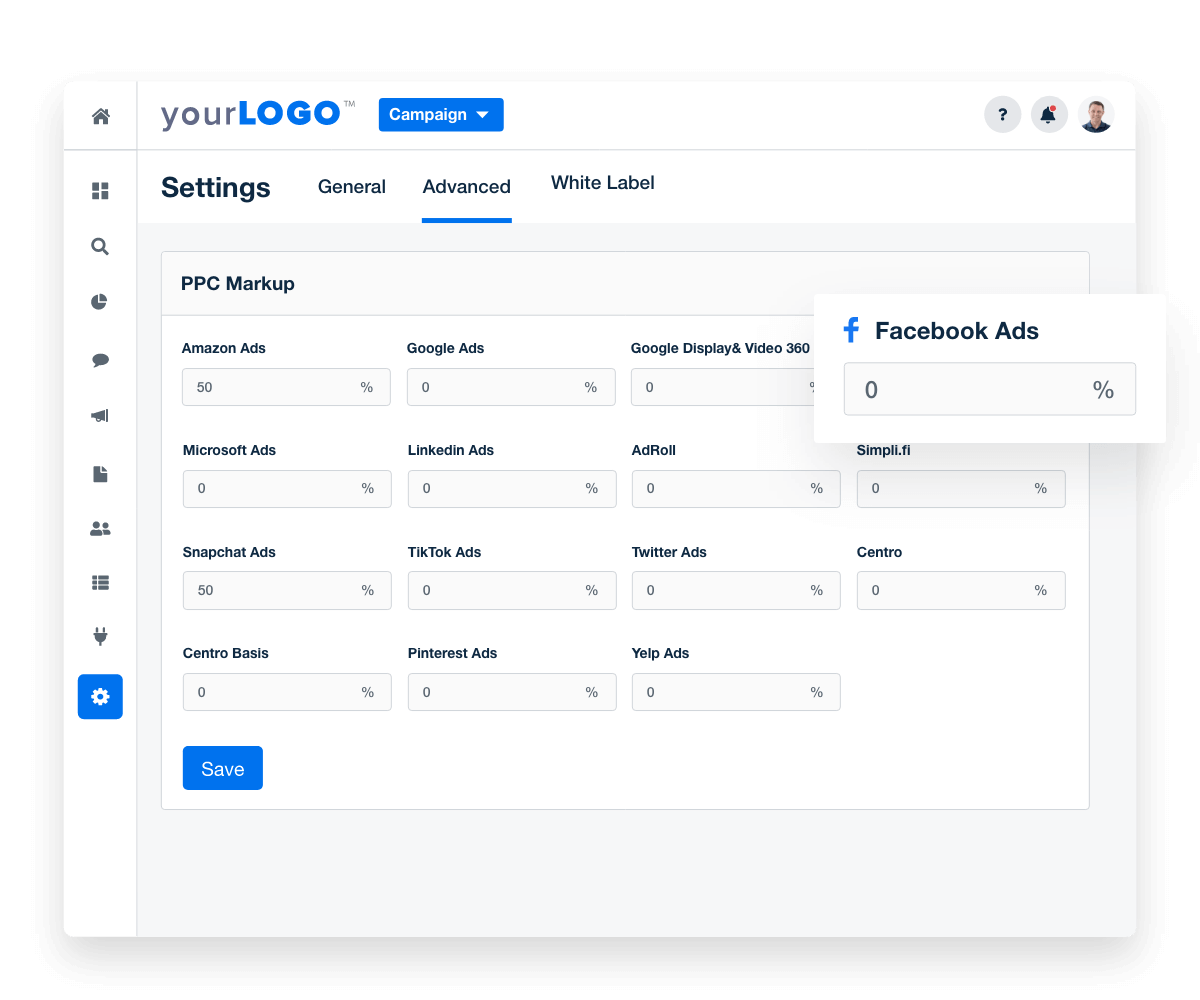
Use the AgencyAnalytics PPC markup tool to automatically apply your markup percentage to all ad spend in your client reports.
Model #4 – The Performance-Based Fee 🏃♂️
This model sounds good in theory—you're rewarded for your hard work and success—and clients LOVE it. They pay much less or nothing if you don't deliver on the promises of your PPC efforts, but it often doesn't translate to the real world.
It can become difficult to stay in control of everything that plays a part in the success of a PPC campaign. It could work if you had total control over sales, leads, landing pages, checkout, and the sales funnel from top to bottom. But you don't, which is why this model doesn't always work.
Model #5 – The Hybrid Model 💵⏱️%🏃♂️
Our pricing varies by client & media buy because it depends on their ad spend level. If the spend is lower, we charge a flat fee. If the spend is higher, we use a percentage of our commission.
Samantha McCanless Dettmer, President, Steel Advertising
Some marketers favor a smaller percentage of total spend, plus a base fee for certain repeatable tasks like weekly PPC reports.
On the other hand, some marketers determine their hourly rate, estimate the hours involved for managing a particular PPC campaign, then charge that as a flat rate. There's guesswork involved, and some PPC agencies are not comfortable with that.
We charge some clients an hourly rate to manage their PPC campaigns, and therefore, invoice them at the beginning of any month for the # of hours incurred the previous month times our hourly rate, but also charge some clients a flat monthly rate. Ultimately the two models aren't so different because we always have a general.
Gail Snow Moraski, Principal, Results Communications & Research
There's a lot to consider. The trick here is to analyze the pros and cons for each candidate as you would when casting a political vote: choose the best fit for you. The percentage model is the most popular, but that doesn't automatically mean it works best in every situation.
We have fixed fees for the campaign set-ups and then we do charge a percentage of the ad spend. We just found that this percentage usually works well with the estimated time it would take to work on the campaigns on a monthly basis.
Blake Baxendell, CEO, Wahha Design
Even after you decide on a price model, there's no magic dollar figure that you should be charging. There are considerations. A checklist, if you will. Hit them all, and your agency will be able to charge more.
PPC Pricing by Platform
Pricing your PPC management services also depends on the platforms you’re managing. Each ad channel has its own competitive dynamics, ad formats, and learning curves that influence both your effort and your pricing. Let’s take a closer look at how some of the most popular platforms influence pricing models.
Google Ads Pricing
As the dominant force in PPC, Google Ads often demands the most attention. Most clients expect to see results fast, which also means it usually requires more time, optimization, and ongoing experimentation than other platforms.
That effort should be reflected in your pricing. Whether you charge a flat rate, a percentage of ad spend, or use a hybrid model, Google Display Network, Google Search Network, and Google Ads campaigns tend to carry the highest management fees for a reason.
Many agencies charge 10–20% of monthly PPC ad spend or a flat monthly fee that starts around $500 for smaller budgets. Larger budgets and more complex accounts command higher costs, especially when conversion tracking, keyword strategy, ad rank, and ad copy testing are included.
Bing (Microsoft) Ads Pricing
While Microsoft Ads reach a smaller audience, they offer strong ROI potential, especially for clients with lower budgets or a B2B focus.
Clicks cost less (up to 70% lower CPCs than Google), and the competition is lighter. But the platform still requires smart campaign setup, keyword targeting, and performance monitoring.
Many agencies offer Microsoft Ads as an add-on service to a Google Ads retainer or bundle it into a flat-fee pricing model. If the platform is part of a multi-channel strategy, some agencies apply a smaller markup or adjust their management fee based on ad spend volume.
Amazon PPC Pricing
Amazon PPC is a different beast. It’s transactional, fast-moving, and completely tied to in-platform performance. Unlike Google or Bing, Amazon Ads live inside an ecommerce environment where customer intent is sky-high.
This often means tighter feedback loops—and more frequent campaign tweaks.
Pricing models vary widely among agencies managing Amazon PPC. Some charge a flat monthly fee based on SKU count, while others charge a percentage of ad spend plus a setup fee. Fees tend to be higher for Amazon Ads because success depends on granular control and near-daily oversight.
Meta (Facebook) Ads Pricing
Meta Ads (including Facebook and Instagram) still represent a significant part of many clients' paid media strategies. The ad formats are versatile, targeting is powerful, and it helps drive qualified web traffic at scale.
However, success with Meta Ads often depends heavily on creative testing and reaching the right target audience through segmentation. That means pricing should account for the ongoing effort required to test, optimize, and refresh creatives.
Most agencies price Meta Ads management similarly to Google Ads, using a flat monthly fee, ad spend percentage (typically 10–15%), or as part of a bundled service across platforms.
LinkedIn Ads Pricing
LinkedIn is highly effective for B2B clients, but it comes with premium CPCs and a steeper learning curve. It's more than targeting job titles; it’s about aligning the offer, messaging, and funnel stages with long sales cycles.
Because of the specialized strategy involved, agencies often charge more for managing LinkedIn campaigns, either by applying a higher percentage of ad spend or including it as a premium add-on.
Clients often need to be educated on the value of LinkedIn's targeting capabilities and what success looks like in a B2B context.
How Do Agencies Price Their PPC Services?
Let's get this straight: PPC management services are not and should not be cheap. It can run anywhere from $250 to $1500 per month on average and can get much, much higher. In this sphere, the maxim that you get what you pay for has never been more accurate.
Below we’ve broken it down into three considerations when setting your agency’s PPC management pricing:
1. Do Competitor Research: What Value Does Your Agency Deliver vs. Competitors?
In selecting your agency's PPC pricing model, you need to look at your agency from every angle. Stand your service in front of a full-length mirror (metaphorically speaking) and scrutinize every flaw and shortcoming. Make a list of its best features.
What exactly are you providing? Initial consultation, setup, analytics integration, keyword research, and selection, copywriting, bid management, ad scheduling, PPC reporting (weekly, biweekly, monthly)?
It's also important to understand how competitive the market is. If your client is in an uncrowded niche, running effective PPC campaigns will be easier than when the competition is stiff.
Does your service also include search term reports, SEO, remarketing, ad performance analysis, restructuring existing ads, and creating new ads (groups and campaigns)? Do you do complementary services like landing page optimization?
The biggest challenge is differentiating from more affordable but poor quality services being offered by so many freelancers or small firms who don't have a very high skillset.’Trust me, we're different’ doesn't really work. They've heard it before.
Lane Anderson, Founder & CEO, London Road Marketing
It's all about the cost-to-value ratio. Your clients will spend more if you give them more. So, what else have you got up your sleeves besides PPC management?
2. Determine Your Agency's Minimum Worth
The Tools of the Trade: Whether you're an established PPC agency that's been around for years, or you're just getting started, you'll always have business expenses.
Here are a few to consider:
Software and subscription services like:
Google Analytics, Wordstream, Optimizely, SEMrush, Clicktale (heat maps, session replays, conversion rate analytics, advanced insights, management tools), and other SEM tools—most of which integrate with streamlined client reporting software
Internet connection, landline, or mobile phone service
Employee salaries
Cash flow requirements
Your own digital marketing expenses
Personal expenses
At the end of the day, whatever your agency charges, you need to pay your bills. So be sure you know how much is enough, and what the industry supports for someone with your credentials (whatever they are) and experience (whatever it is).
Look around. Compare yourself.
Are you doing everything the major players offer, or are you a more budget-friendly option?
Both have their value.
Not sure where you stand at this moment in time?
The competition’s always changing, so conduct a PPC competitor analysis for your own agency, as well as your clients!👇
3. Be Clear on What Is Included in Your PPC Service Offerings
The cost of launching a PPC campaign from scratch is very front-end heavy. It takes a lot of time and energy to get it out of the gates.
Typically, PPC management services involve:
Performing a full competitor analysis
Planning the campaign strategy
Copywriting the ad creatives
Designing the ad and landing page
Managing bids
Testing campaign performance
Tracking marketing metrics and reporting on them with PPC management software
Read our full PPC management checklist!
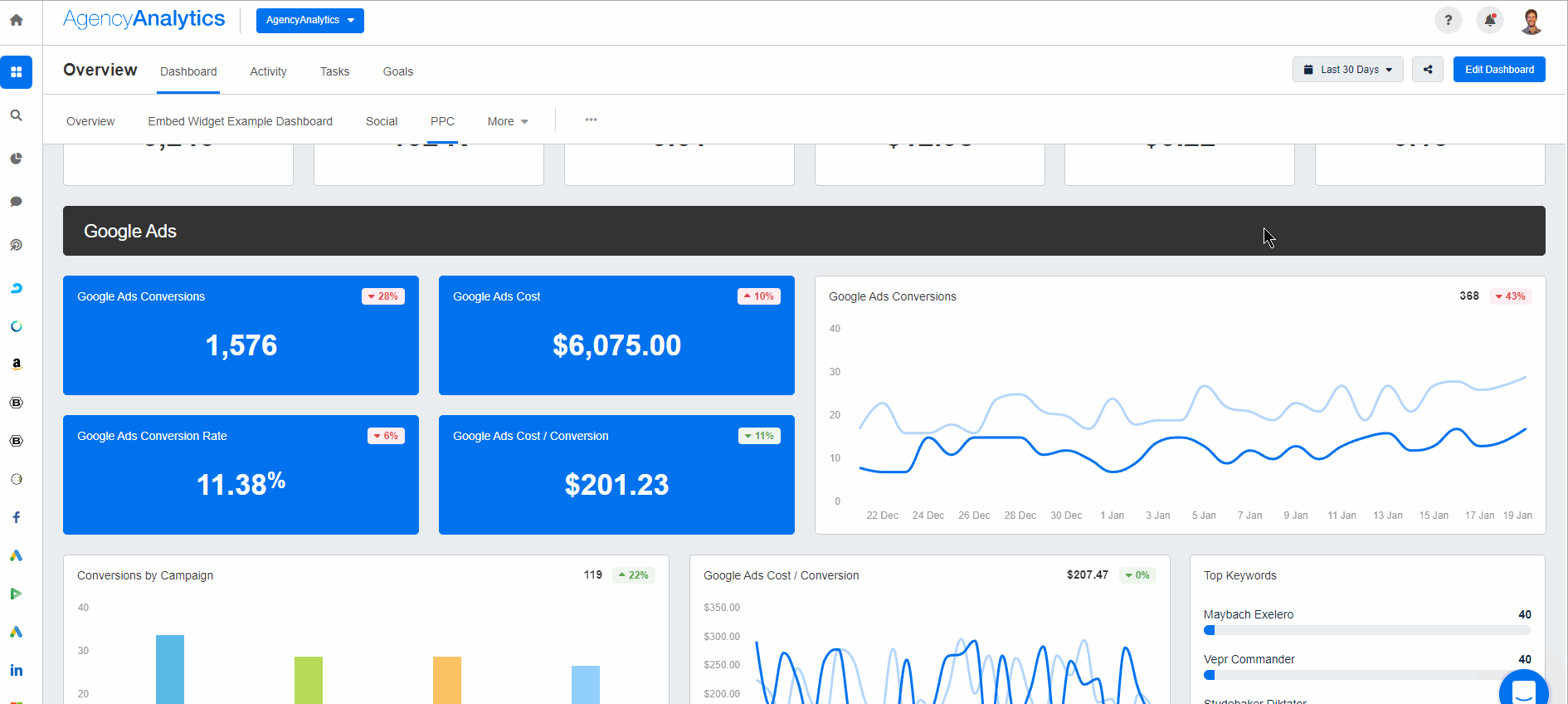
Streamline your PPC Reporting and house all your clients’ PPC metrics under one roof and include your margins in your automated client reports. Try this exact Google Ads dashboard or a more comprehensive PPC dashboard template with your free 14-day trial today.
Time Is Money, Too
If you swoop in and do the heavy lifting from day one, you should consider your setup fees. You can either charge a hefty launch fee, or you might waive that initial PPC cost to get the ball rolling and bring in steady income.
To set up a brand new account with several campaigns, you should expect the agency may need to spend 15 - 25 hours to do that work (including an initial discussion with you about campaign objectives and messaging), particularly if it's a Google search campaign where negative and positive keywords need to be set up, plus various ad assets like site links.
Gail Snow Moraski, Principal, Results Communications & Research
Clients generally prefer a lower up-front charge in exchange for a higher ongoing/monthly management fee. There's less risk for them, as the real management cost doesn't kick in until the campaign is (hopefully) doing its thing and bringing in revenue.
With any display campaign, there's the ironing out of images or video to be used, and sometimes, revisions need to be made to an existing website landing page (page ad clickers will land on) or a new landing page set up. Often there's a lot of back & forthing with the client to get their approval to proceed with various images, ad content, etc., as well as work to put results tracking in place. All of the aforementioned takes time.
Gail Snow Moraski, Principal, Results Communications & Research
Your agency, however, may only be breaking even (or even losing money) at this stage, but can look forward to higher profit margins once the campaign is running smoothly. Can your agency afford to wait it out?
For existing campaigns, your PPC manager may be called in to take over, in which case they'll start with a PPC audit.
What exactly does that include (campaign settings, ad groups, keywords)? How long will it take you? Are you going to charge for it, or roll it into the monthly management fee?
Educating clients is often the biggest challenge we face. Their expectations versus the reality of what is possible are often far apart. Clients want something delivered immediately and for it to be perfect. The reality is that great work takes time and care.
Nick Farnborough, Founder, Clavis
Be VERY clear about what your clients get, and what they don't get (perhaps offering a wide variety of add-ons they can opt for down the road). The add-on menu works at fast food joints for a reason…different people want different things.
Goal! Goal! Goal!
Of course, no campaign will accomplish anything without clearly defined and identified goals. So, what are they? And does your price ultimately work within your ideal client's budget? Go after smaller fish at first, but remember that they have smaller wallets, too.
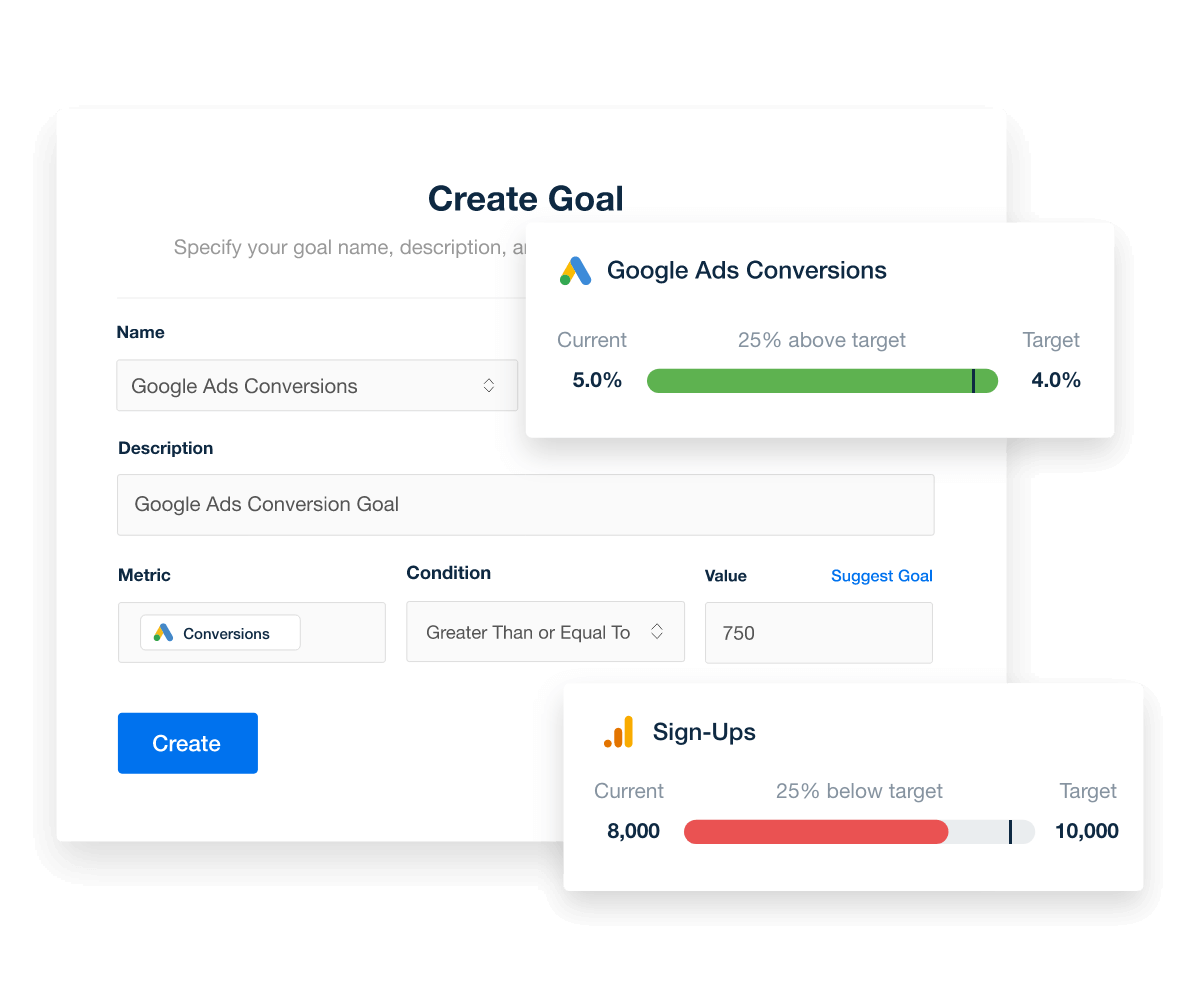
Incorporate goals into your client reports to easily communicate your campaign successes. Try it free on AgencyAnalytics for 14 days.
4. Focus on ROI – For the Client and Your Agency
When pricing PPC management services, balancing your agency’s profitability with clear ROI communication is essential. Clients want to know their investment is generating tangible results, and your agency needs to ensure its pricing structure supports long-term profitability and scalability.
Here's how to focus on ROI for both sides of the equation:
Communicating ROI to Clients
Clients are less interested in the technical intricacies of PPC and more concerned with the outcomes. Demonstrating ROI effectively is a critical part of client retention and trust-building. Here are some ways to frame and showcase ROI:
Use Data to Tell a Story: Translate metrics like click-through rates (CTR), conversion rates, and cost per acquisition (CPA) into real-world business outcomes. For example, “Your ad campaigns brought in 200 new leads this month, which resulted in $10,000 in additional revenue.”
Visualize the Value: Utilize PPC dashboards and automated reports to create clear, visually appealing summaries. Graphs comparing ad spend to revenue generated or trends in lead generation over time help clients see the bigger picture.
Highlight Cost Efficiency: Emphasize the value of your expertise in maximizing their budget. For example, explain how strategic bid management reduced costs while maintaining or increasing results.
ROI Benchmarks: Establish clear expectations upfront by setting ROI benchmarks tied to specific goals (e.g., 2:1 return on ad spend). Consistently refer back to these benchmarks in your reporting to show progress.
Case Studies: Share anonymized case studies that showcase similar clients’ success stories. This demonstrates your agency’s ability to deliver measurable results.
One great way to highlight the potential and current ROI is by comparing your agency's performance against industry-specific benchmarks.
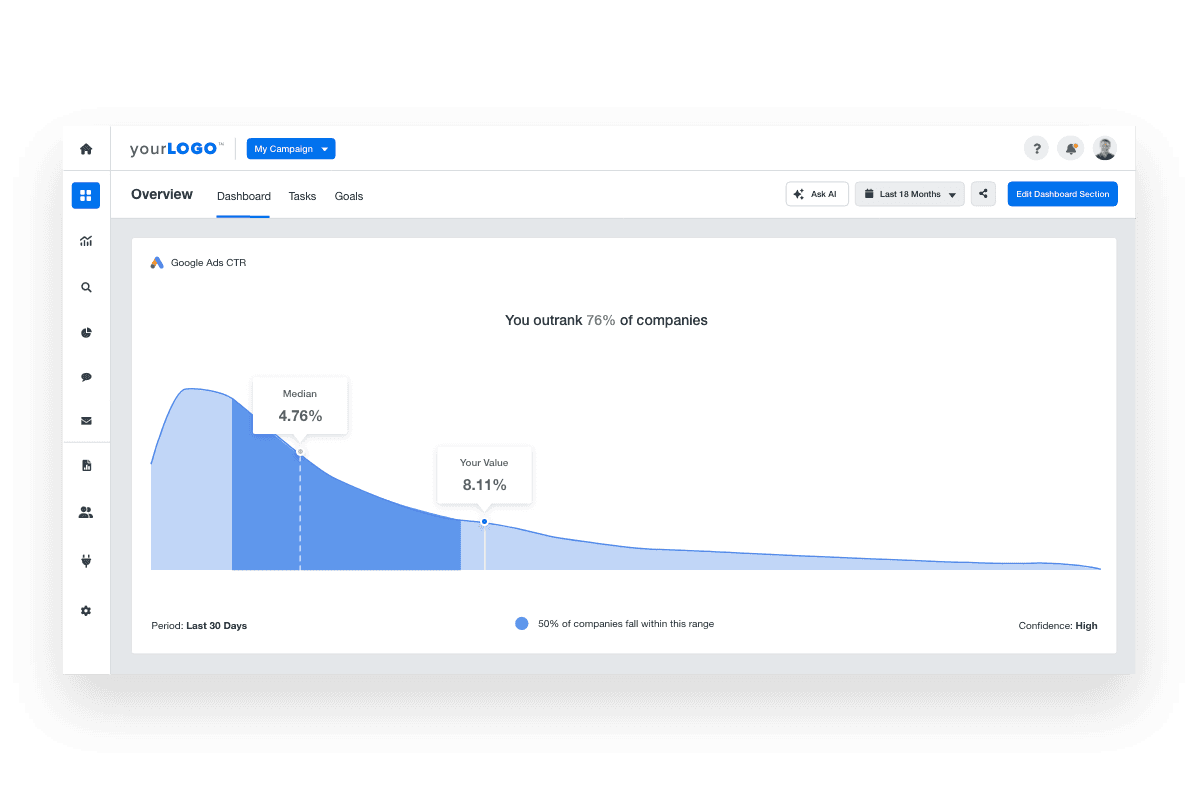
By showing how your agency meets or exceeds industry medians across key PPC performance indicators, you not only reinforce your agency's skills and expertise, but reinforce why your agency is the right choice for the client's PPC management.
Ensuring Your Agency’s Profitability
While it’s essential to provide value to clients, your pricing structure must also ensure your agency remains profitable and scalable. Here’s how to approach ROI from your agency’s perspective:
Factor in All Costs: Include software subscriptions, PPC management team salaries, and the time spent on campaign management, reporting, and client communication when calculating your pricing. Ensure you’re not underestimating the resources required.
Avoid Scope Creep: Be explicit about what’s included in your pricing model, such as the number of campaigns, ad groups, and reporting frequency. Clearly define add-ons to prevent unplanned workload increases.
Incorporate Performance-Based Incentives (Cautiously): If you offer performance-based pricing, ensure it aligns with factors you can control. For example, focus on SEM metrics like lead volume or ad engagement rather than final sales conversions, which might depend on the client’s sales funnel.
Track Internal ROI: Monitor how your pricing models perform over time. Are certain clients or pricing structures leading to higher profit margins? Use this data to refine your pricing strategy.
Invest in Efficiency: Streamline your workflows with tools like PPC automation and reporting software. By reducing manual work, you increase your team’s capacity for high-value activities.
By focusing on ROI for both your clients and your agency, you create a pricing structure that justifies your value, retains clients, and supports your agency's long-term growth. Communicate clearly, deliver measurable results, and ensure your efforts are appropriately rewarded.
This dual focus will position your agency as a trusted partner while maintaining a healthy bottom line.
Agency Pro Tip: Your agency pricing model isn’t the only thing that affects your revenue—your pipeline matters too. If you’re serious about getting more PPC clients, focus on optimizing your onboarding, reporting, and proposal processes to close deals faster and show value sooner.
So... How Much Should YOU Charge?
As a rockstar marketing agency, your team has to be skilled in many things. That means you often offer what your clients need, and in many cases, that includes pay-per-click (PPC) campaign management.
But paid search is no easy feat.
Your PPC marketing strategies should be supported by KPIs like click-through rate while staying aligned with each client’s overall business goals. Plus, PPC management generally involves perfecting visuals and ad copy for each ad campaign.
Consider your agency's background and experience.
How long have you been doing this?
What sets your agency apart from other PPC experts?
Are you a Google Partner? Are you an Accredited Microsoft Ads Professional?
Do you have dozens of glowing recommendations?
Do you keep up with new developments and trends in the PPC arena?
How you price your agency’s PPC depends on various factors, including your size, background, and even the ad channels you use. Your clients may be willing to spend anywhere from $500 per month to the tens of thousands per month on PPC management–it all depends on their budget, conversion goals, and the PPC ROI you deliver.
Download the Free PPC Budget Calculator 👩💻
Using a PPC planning worksheet template will help you plan and decide your clients' PPC budgets.👇
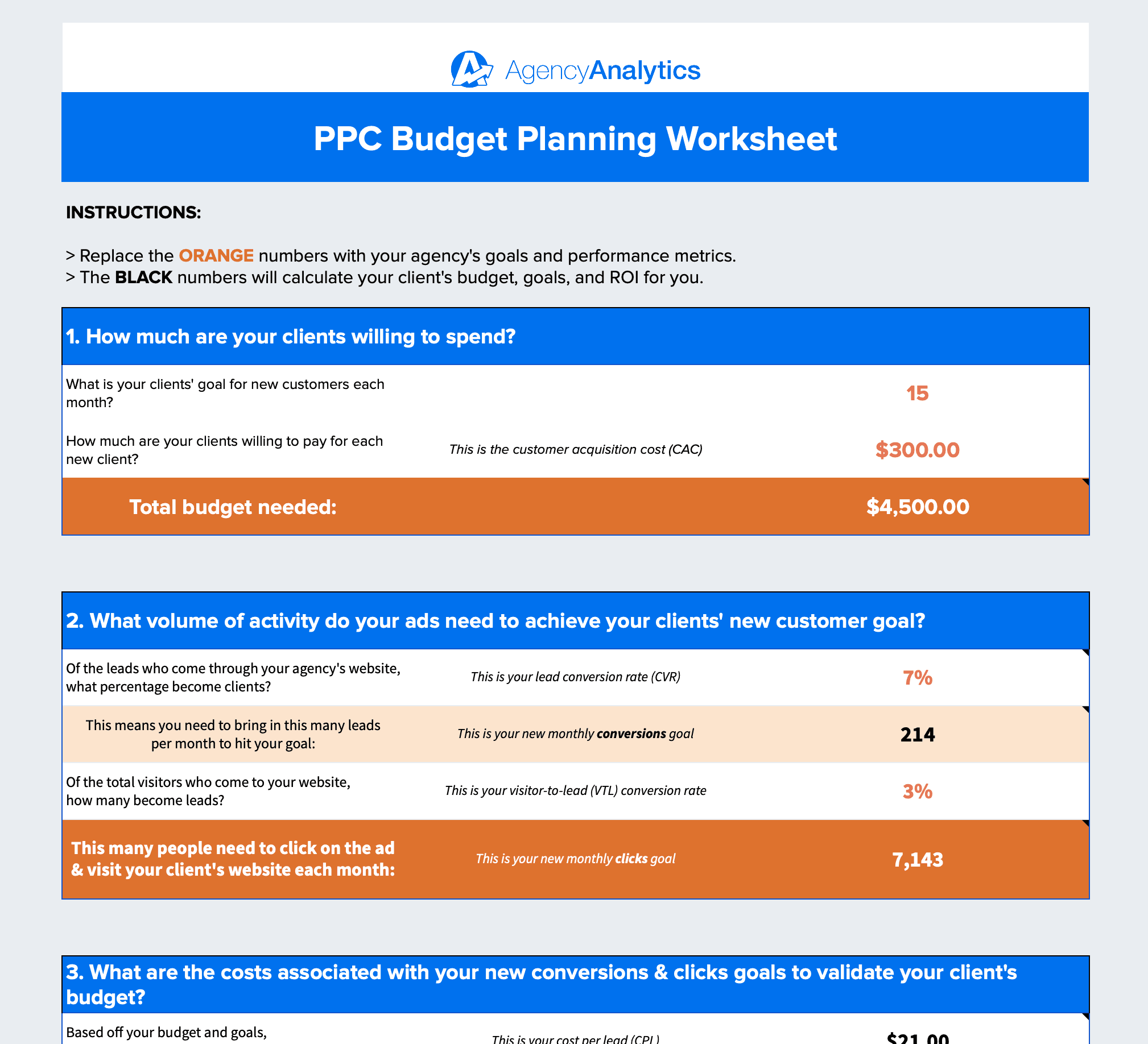
Better PPC Reporting = Higher PPC Management Fees
Now that we've discussed different payment models and several considerations in determining what to charge, let's look at how to improve your agency's PPC reporting to make it more efficient.
1. Access All of Your Client's PPC Campaigns on One Platform
PPC management often involves dealing with multiple platforms and paid search analytics sources. If you're doing your reporting manually, the time it takes to aggregate and present the data adds up quickly. For this reason, PPC reporting should be automated as much as possible.
Create your own white labeled PPC Report in minutes with this exact PPC report template below:

Clearly communicate your agency’s success in driving ROI with a customizable Amazon Ads Report Template or a professional Google Ads Report Template. Try AgencyAnalytics free for 14 days!
One of the most important parts of managing PPC campaigns is client reporting. And although the argument can be made if agencies should charge for client reports), it's not necessarily a revenue-generating activity.
Regardless of how good you are at PPC management, reporting on your results in a professional and easy-to-understand way is crucial to building long-term relationships with clients.
2. Add a PPC Markup to Reports
Aside from automated reporting, another useful way to manage your agency's PPC workflows is by using the AgencyAnalytics PPC markup tool.
If your agency decides to go with the PPC markup pricing model, this feature allows you to add your agency's margin to each of our PPC integrations.
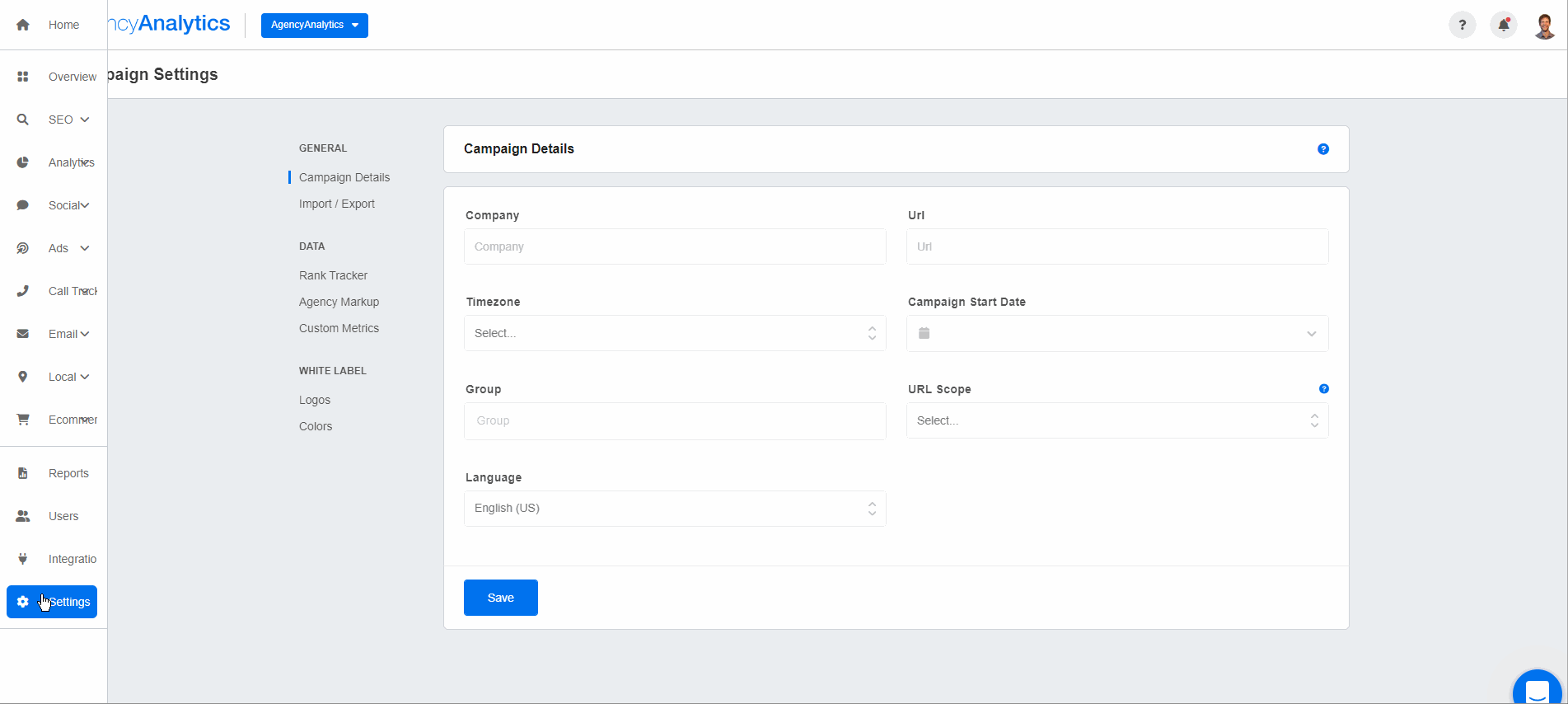
Create an intuitive PPC Report that automatically includes your markup. Try AgencyAnalytics free for 14 days!
Choose whether you want to only show clients the PPC markup, or whether you want to exclude it from your reports and only display the total cost.
Specify a separate markup for each one of your client's PPC integrations, and once configured, the PPC markup will automatically be applied to all your client reports.
Configure an account-wide PPC markup:
Click "Edit Profile" in the top right corner of your account
Under the "Advanced" tab you'll find the PPC markup feature where you can specify the margin percentage for each integration
Choose whether you want to show or exclude your PPC markup by clicking on the Settings slider at the top right of the PPC dashboard
Select "Show PPC Markup" or "Exclude PPC Markup" from the drop-down menu
If you want to learn how to configure different PPC markups for individual campaigns, check out this article from our Help Center.
3. Manage Your Agency
AgencyAnalytics offers a variety of client and staff management tools that make your agency’s PPC processes as efficient as possible.
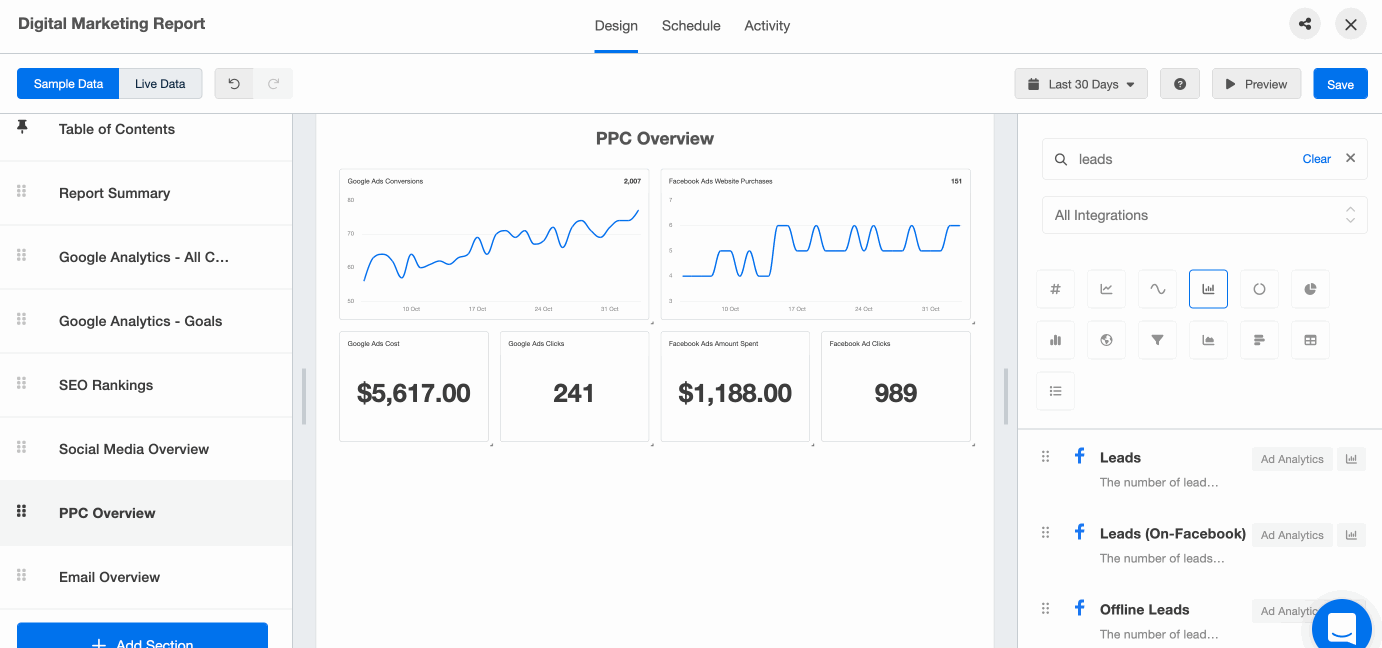
With an easy-to-use drag-and-drop editor, creating custom PPC reports has never been easier. Try AgencyAnalytics free for 14 days.
Whether you’re looking to hire a freelancer or need to communicate within your internal team, unlimited user controls make collaboration easy and keep everyone on the same page.
Create tasks for each campaign, assign them to team members, and track their progress to ensure everything is organized.
Agency Pro Tip: Add completed tasks to your client’s monthly reports to showcase the value your agency brings to their business.
4. Create Instant Reports
Show your clients that your PPC agency is delivering a return on ad spend and any plans you have to improve their current strategy with PPC reports. Pushing out reports to show that your agency is consistently staying up to date with trends will take up too much time as your agency grows.
Having the ability to see which marketing channels are performing or the ability to verify analytics from PPC campaigns gives customers the information they need when it comes to where they spend their marketing budget.
Ryon Gross, CEO, Local Leap Marketing
Send out your PPC reports with easy scheduling that features your agency’s logo, brand colors, and URL. Plus, decide if you want to approve each report before it gets sent out if you want to review or address any issues.
5. Use Tools That Scale as Your Agency Does
AgencyAnalytics has 16 different PPC integrations to choose from, giving your agency the flexibility to test out different platforms for your clients.
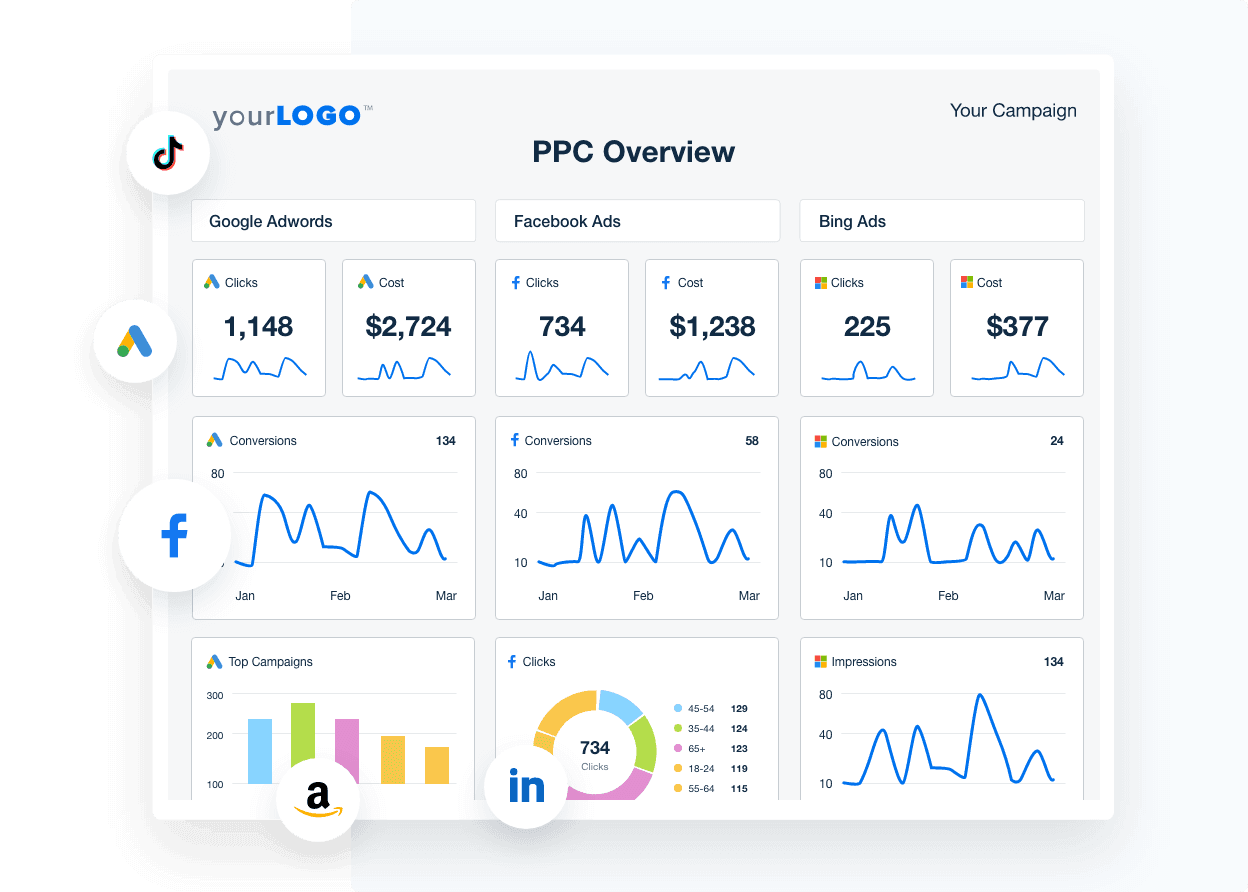
And when it comes time to create their reports, you won’t need to jump from platform to platform to pull their data.
Key Takeaways
On average, businesses make $2 for every $1 they spend on Google Ads. So when it comes to PPC, your clients should understand that in order to make money, they need to spend money.
Can you deliver increased traffic, better leads, higher conversions, and a solid ROI? Then you should be paid accordingly.
PPC management is not frivolous, nor is it a luxury. It's a modern business necessity. And the best PPC agencies are providing a robust service that includes Google Ads and/ Microsoft Ads, and Facebook Ads (as well as other social media platforms).
Read More: How To Price Your Social Media Services
The best can do it all and tailor their services and pricing based on their clients’ needs. Ensure your agency is equipped to deal with whatever the industry throws at it, and don’t be afraid to test out new platforms.
Combine all your clients’ PPC KPIs into an easy-to-understand dashboard that updates itself automatically, and flip it into a report in minutes. With over PPC integrations to choose from, create custom client reports that clearly communicate the value your agency is bringing. Start your free 14-day AgencyAnalytics trial today.
Impress clients and save hours with custom, automated reporting.
Join 7,000+ agencies that create reports in under 30 minutes per client using AgencyAnalytics. Get started for free. No credit card required.
Already have an account?
Log inFAQs About Setting or Adjusting Your PPC Management Pricing
Struggling to price your PPC services? These FAQs help you balance profitability, client value, and long-term agency growth.
Marketing agencies typically offer PPC management pricing using one of four models.
The flat monthly retainer is simple and predictable—ideal for standard service packages. A percentage of ad spend (usually 10–25%) scales with client budgets and works best for managing large Google Ads campaigns.
Some agencies use tiered or hybrid models, combining a flat base fee with a variable add-on. Others may opt for performance-based pricing, especially when tied to conversion goals or high-quality leads.
Select a structure that aligns with your values, safeguards your margins, and is suitable for your client base.
The most common pricing model for PPC management is a percentage of ad spend, typically ranging from 10% to 20%.
This model scales well with budget and ensures you’re compensated fairly as campaigns grow. However, it’s not always ideal for smaller businesses, so many agencies implement a minimum monthly fee to ensure coverage for time and tools.
For complex services or cross-platform campaigns, a flat monthly rate may make more sense. Align your pricing with effort, value, and client expectations—not just budget size.
Quick Tip: Easily apply a custom PPC spend markup to marketing dashboards and reports, ensuring clients only see total ad costs with your marketing agency’s margin included.
PPC pricing should reflect the complexity and scope of your work. Key factors include:
Monthly ad spend
Number of platforms (e.g., Google Ads, social media)
Campaign features (like remarketing or landing page optimization)
Reporting expectations
Use of third-party PPC tools
Time required to manage and optimize campaigns
If you're offering more than basic ad management, your pricing should account for strategy, reporting, and monthly performance reviews. Tailor your packages to both client goals and agency efficiency.
A typical fee starts between $500–$2,000 per month for small to mid-sized clients.
Many agencies charge 10%–20% of ad spend, sometimes with tiered structures or minimum thresholds. Larger or more complex accounts may exceed $5,000 per month.
A “reasonable” fee balances value and profitability. Your pricing should account for time, tools, expertise, and how much support your client needs.
Frame your fee around client outcomes—like better leads, lower CPA, or more conversions—not just campaign maintenance.
Flat-rate pricing offers predictability for both you and your client. It works well for fixed-scope services or when ad budgets are consistent.
Percentage-of-spend pricing scales with client investment, tying your fee to their growth. However, it may raise questions if spending increases without corresponding improvements in results.
Many agencies opt for a hybrid model: a base fee plus a variable percentage or performance bonus. This ensures fair compensation while keeping expectations aligned.
Start by positioning your agency as a strategic partner—not just a campaign operator.
Premium PPC pricing is easier to justify when clients understand they’re getting more than bid adjustments. You’re offering strategy, conversion insights, ongoing A/B testing, custom reports, and consistent monthly performance reviews.
Use client results and case studies to back up your claims. Communicate value in terms of business outcomes—more leads, better ROAS, and real growth.
Clients pay more when they see you’re helping them make more.
A solid PPC package should include:
Campaign setup and audits
Keyword research and ad copywriting
Bid and budget management
Conversion tracking and form tracking
A/B testing and monthly optimizations
Reporting and strategy calls
You can also upsell services like landing page design, remarketing setup, or funnel tracking.
Being clear about what's included (and what isn't) helps avoid scope creep and reinforces the value of your PPC management fee.
Review your pricing at least every 6 to 12 months.
Adjust your fees if you're offering new services, using more expensive tools, or taking on more complex client work. Also reevaluate when Google Ads changes significantly or when your own cost of service delivery increases.
Watch for scope creep—are you doing more than you're billing for?
A quick internal audit helps ensure your PPC pricing models still reflect the real value you're delivering.

Written by
Melody Sinclair-Brooks brings nearly a decade of experience in marketing in the tech industry. Specializing in B2B messaging for startups and SaaS, she crafts campaigns that cut through the noise, leveraging customer insights and multichannel strategies for tangible growth.
Read more posts by Melody Sinclair-BrooksSee how 7,000+ marketing agencies help clients win
Free 14-day trial. No credit card required.



